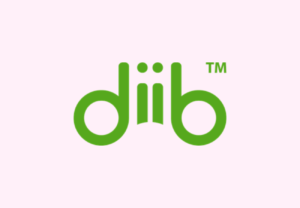Usually, secure server hosting is the practice of protecting your website server from unauthorized access. There are several ways to keep your website safe, such as strong passwords, the Two-Factor Authentication (2FA) process, and more. Innovative security measures can help you protect your website from malware and hackers. For example, you can use an anti-malware security tool.
This tool helps you block malicious code and run regular updates to update your website with the latest security patches. In layman’s language, website security is essential for an eCommerce business, as these often contain sensitive information such as credit card numbers and personal data. Fortunately, many web hosting providers offer security features to help protect your website.
However, you can also use a security plugin for added protection. Additionally, you’ll want to create regular website backups. This way, if your website does get hacked, you can restore your content. The three main types of Secure Server Hosting are physical, network, and host. In cloud computing, network connections are safeguarded by firewalls, preventing unauthorized access.
Server protection security in web hosting is a set of precautions to safeguard against diverse threats. Technically, it’s about protecting the server from attacks that try to overload it (DDoS attacks), stopping people from guessing passwords too many times (brute force attacks), and ensuring users don’t mess things up on purpose or by mistake.
Understand What A Secure Server Hosting Entails In Cloud Computing Technology
In today’s digital world, the threat of cyberattacks keeps everyone on their toes. The projected losses from data breaches, expected to soar past $5 trillion by 2024, are no small concern. Cybercriminals are getting craftier daily. Thus, according to Accenture, cybercriminals are constantly putting big names like Marriott International and Yahoo and the little guys in the firing line.
Server risk involves outdated software, as aging software can have vulnerabilities exploited by cybercriminals. Regular patching is essential to prevent the exploitation of known weaknesses and to enhance security. The protective measures involve firewalls, strong password policies, user authentication protocols, antivirus software, and routinely backing up data to avert potential losses.
Small businesses take a hit in 43% of cyberattacks. This scenario makes picking a web hosting provider as solid as a rock crucial. We mean, it’s your digital business operations fort. That’s why secure server hosting matters for you. Luckily, if you Pick Cloudways, you won’t have to worry about server security. One thing is sure: Their servers come pre-equipped with features like Firewalls.
As well as Port Security, Database Security, Application Isolation, and much more. Regularly updating and upgrading your software helps remove unnecessary services, hides server information, uses intrusion detection systems, and more. It also helps perform file and service auditing and set up a firewall. Regular backups are crucial. There are many Secure Server Hosting techniques.
Why Secure Server Hosting Security Is Essential
It can be hard to wrap your head around unfamiliar technical terms like hosting or understanding the security frameworks they support. But it’s still all too important. Imagine investing in your website and having it fail as the number of visitors and customers grows. Sounds like a nightmare, right? Too many unethical systems and businesses use your emails and website for advertising.
But you can avoid this situation by looking into a package with excellent web hosting security that includes a virus protection program. Web hosting security plays a significant role in decreasing hosting costs. Your online business success depends on it. However, some hosting providers use outdated and poorly maintained servers. It can be challenging to determine which web hosts offer the right services.
Resource Reference: Why Is Web Hosting Security Such A Critical Component For Webmasters
Hosting companies with highly secure servers are hard to identify. Beautiful pictures and great hosting plans are all over the internet, but you can never tell what lies behind them. If you want your website to be more secure, you should only purchase web hosting from companies with specific security features. Here are five elements that will make your data more secure and your visitors more satisfied.
Essentially, Secure Server Hosting is about fortifying the security of a web hosting server to ensure smooth and secure operations. When selecting a hosting provider, refer to the guide on 10 key factors to consider in web hosting security. When considering web hosting, it’s all about ensuring the digital space where your business data lives is rock-solid.
Why a secure server matters:
- Reliable Information: Good web server security ensures your stored data is accurate and complete, like a safeguard against unwanted changes.
- Always Accessible: Security measures keep your digital space open for business, ensuring it’s available whenever you or your authorized users need it.
- Securing Sensitive Data: Your server acts as a secure vault. Strong security prevents unauthorized access to sensitive information, keeping it confidential.
- Protecting Your Business Image: A security breach could harm your business reputation and lead to financial losses. A secure server acts as a protective shield against such incidents.
- Compliance with Rules: Big companies have specific rules to follow. Web hosting with solid security ensures your digital space meets these rules, avoiding fines and maintaining legitimacy.
So, when you’re in the market for web hosting, think of it as finding a reliable digital space with solid security measures in place.
Web Hosting Server Security Issues
If you’re exploring web hosting, you might wonder about typical security issues. Here are critical considerations for those seeking a hosting service with robust server security:
- Vulnerabilities to Attacks: Look for hosting services addressing vulnerabilities that could make your site a target. The right provider should actively shield against common cyber threats.
- Weak Authentication Practices: Ensure the hosting service has strong user authentication measures. This is like having a secure lock on the virtual door to your website.
- Insufficient Backup Procedures: Check if the hosting service regularly backs up data. It’s like having a safety net—important in case anything unexpected happens.
- Outdated Software Risks: Opt for a service that updates server software. This is similar to regularly installing updates on your computer for better performance and security.
- Lack of DDoS Protection: Confirm the hosting service has defenses against Distributed Denial of Service (DDoS) attacks. It’s akin to having guards to prevent overcrowding and disruptions.
We don’t want to brag, but — if you don’t want to break a sweat worrying about these common security concerns, consider Cloudways, a web hosting provider with robust server security features already built-in.
Secure Server Hosting Features
For example, RAID is an excellent way to protect data. Your files will remain safe even if the server fails. However, the feature is expensive and isn’t included in most shared plans. You can purchase RAID from some web hosts for an extra fee.
Peak Performance:
- Free Caching Plugin
- Dedicated Environments
- Built-In Caching Mechanisms
- Up-to-Date PHP Versions
- Free Object Cache Pro
- Enhanced HTTP/2 Servers
- Optimized PHP-FPM
- Enterprise CDN
Exceptional Support:
- 24/7/365 Live Chat
- Online Ticketing
- Enhanced SLAs
- Application-Level Issue Resolution
- Proactive Application Monitoring
- Private Slack Channel
- Fast Response Times
- Phone Access
Enterprise-Grade:
- Layer 3 & 4 DDoS Mitigation
- Vulnerability Scanner
- 1-Click Free SSL
- IP Whitelisting
- Regular Security Patches
- Automated Protection with Fail2Ban
- Dedicated Server-Level Firewalls
- Bot Protection
Cloud Computing:
- Global Availability
- Renowned Cloud Providers
- Seamless Vertical Scaling
- 1-Click App Deployment
- Multiple PHP Versions
- Pay-as-You-Go Plans
- Flexible Add-Ons
- Support for All PHP Apps
Streamlined Workflows:
- Git Integration features
- Seamless Workplace Teams
- Streamlined projects workflows
- WordPress Cron Optimizer
- One Account, Multiple Teams
- Server & Application Cloning
- Staging Areas & URLs
- Server Transfer
Tasks Management:
- Cron Job Manager
- Pre-installed WP-CLI
- App Settings via UI
- 1-Click Backup & Restore
- Server Configuration & Package Management
- Supervisord Queue Management
- Custom Varnish Settings
- Flexibility in Webroot
Advanced Hosting:
- SafeUpdates
- Elastic Email
- Rackspace Email Add-on
- Managed Migration Add-On
- Application Upgrade Add-On
- New Relic Integration
- Cloudflare Enterprise
- DNS Made Easy
- Support Add-ons
- Cloudways API
Enhance app performance insights by enabling New Relic, empowering you to troubleshoot and identify bottlenecks and issues. Your server is under constant surveillance, 24/7/365, providing access to over 16 metrics via the console. Receive real-time performance insights to optimize your servers and applications. Integration with Slack, emails, and more keeps you informed.
How Secure Server Hosting By Cloudways Foster Mission-Critical Websites
Now, we’ll explore the intricate RAID that makes Cloudways a powerhouse in ensuring the security of your server.
1. DDoS Mitigation
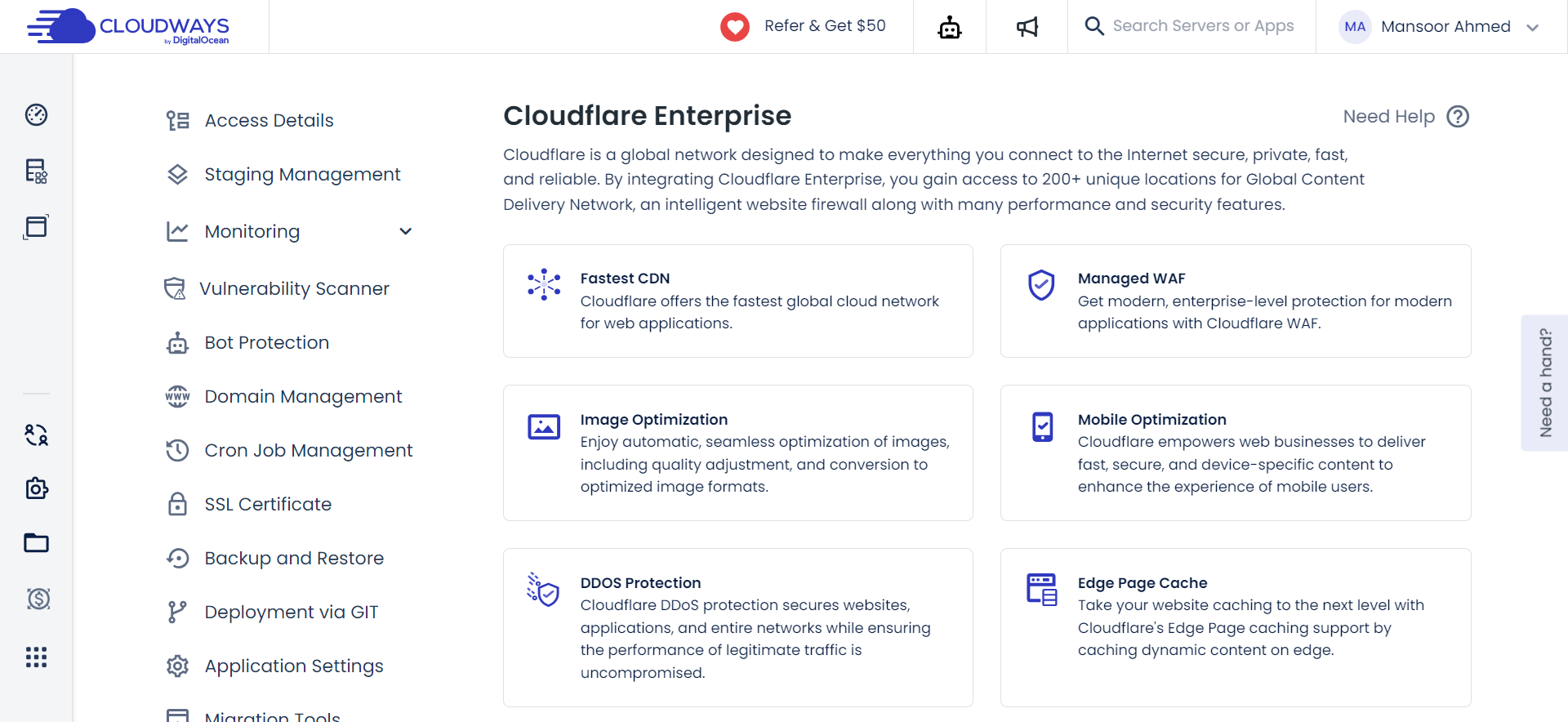
DDoS attacks stand as potential disruptors to your server’s stability. To counter this, Cloudways incorporates Layer 3 & 4 DDoS Mitigation. This acts as a protective shield, fortifying your server’s resilience. Collaborating with leading cloud providers, Cloudways ensures your server remains steadfast even when faced with intense DDoS attacks. It’s a precautionary measure, safeguarding your online presence and preserving accessibility. If you’re thinking of hosting a WordPress site on Cloudways, you might find this guide on how to stop WordPress DDoS attacks helpful.
2. Vulnerability Scanner
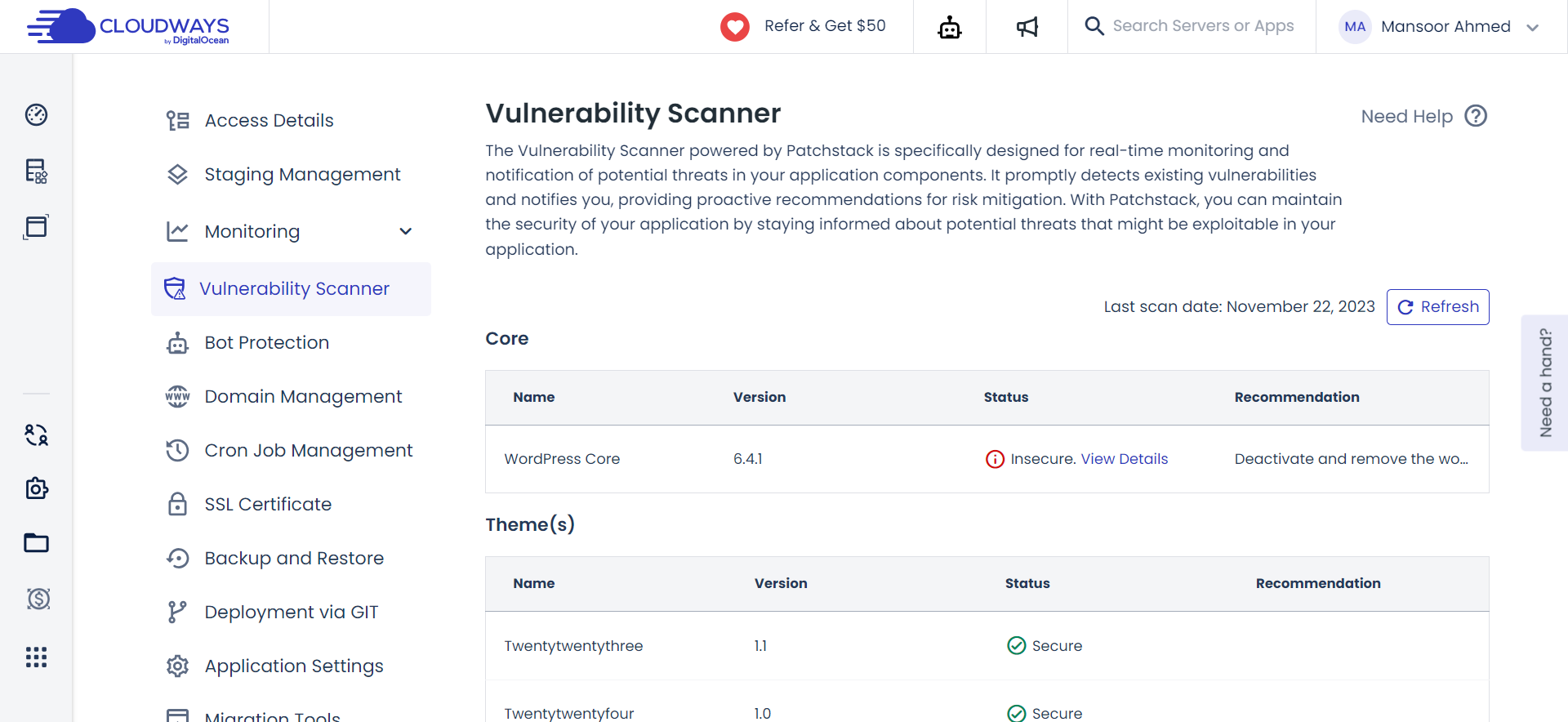
Navigating the dynamic landscape of online threats can be challenging, especially when identifying vulnerabilities in your WordPress core, plugins, and themes. Cloudways introduces the Vulnerability Scanner, powered by Patchstack. This feature serves as a vigilant watchman, providing instant notifications and conducting continuous audits. It’s an ally in maintaining a secure environment, alerting you to potential risks, and enabling timely action.
3. Free SSL Certificates
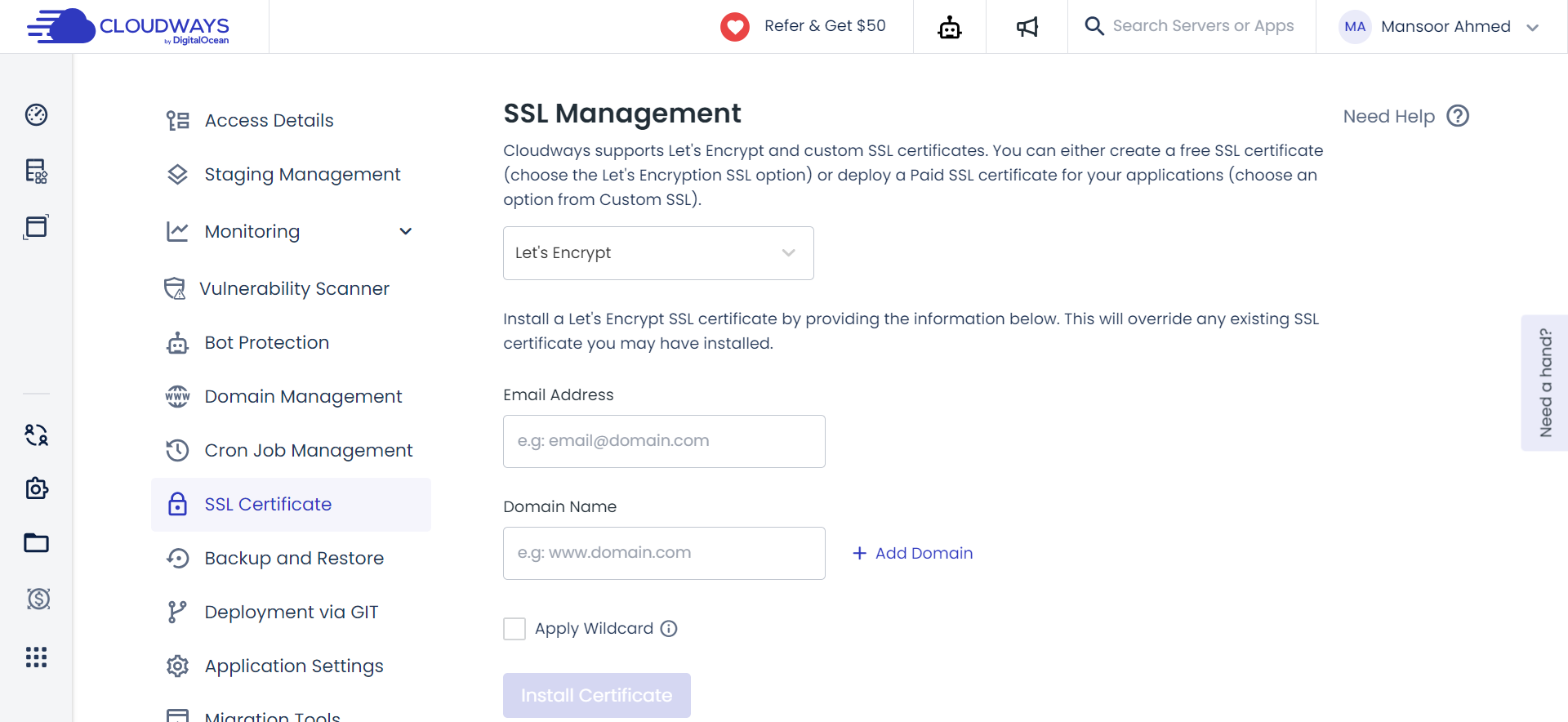
In an era where online trust is paramount, securing your website with SSL is crucial. Recognizing the complexity and cost associated with this process, Cloudways simplifies it with 1-Click Free SSL. This built-in Let’s Encrypt SSL secures your data in transit and fulfills HTTPS requirements. It’s a straightforward solution, enhancing the security of your website without additional complexities.
4. IP Whitelisting
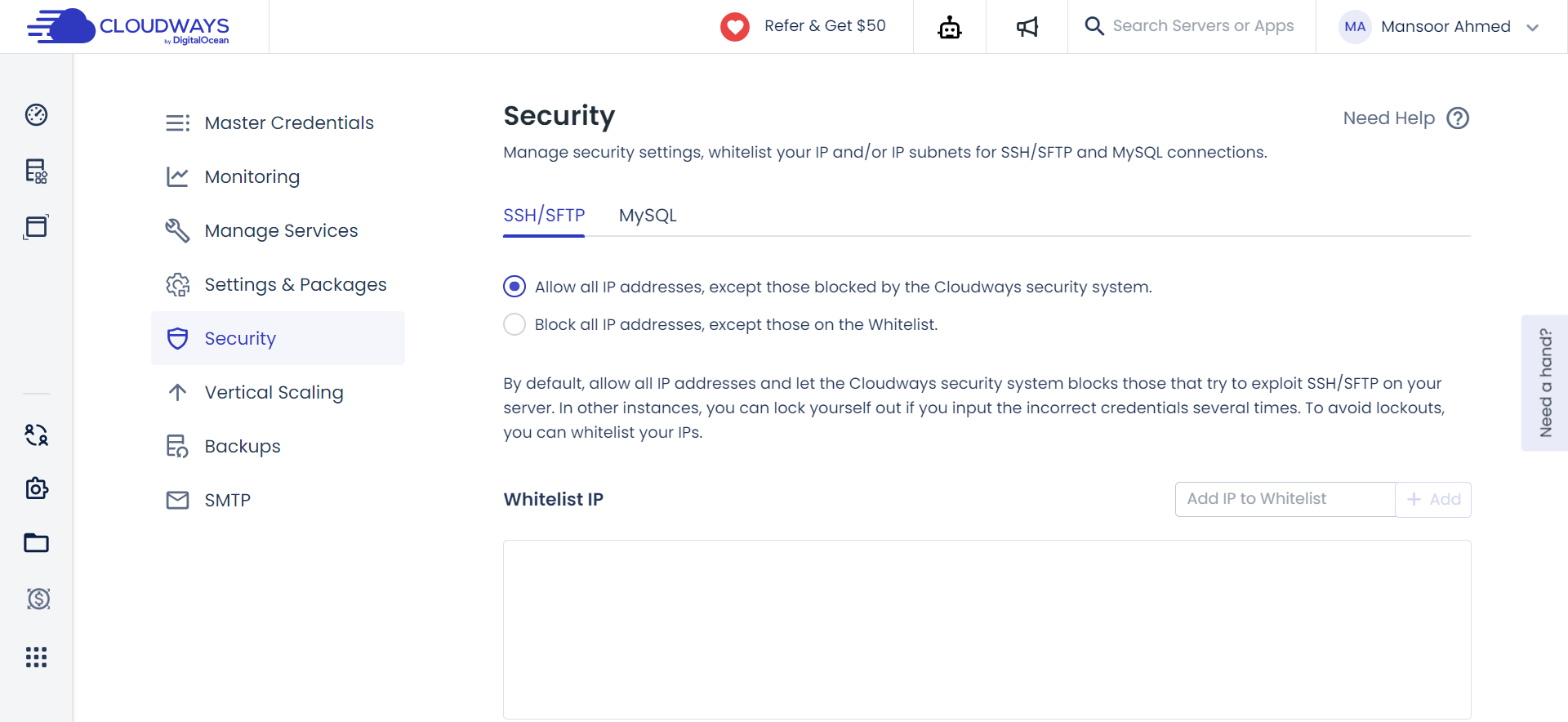
Collaborating on a server often involves providing secure access to specific networks or regions. Cloudways addresses this challenge with IP Whitelisting. This feature streamlines collaboration by allowing you to whitelist specific IPs, ensuring unrestricted access to SSH and SFTP. It’s a practical approach, enhancing security while facilitating seamless collaboration.
5. Regular Security Patches
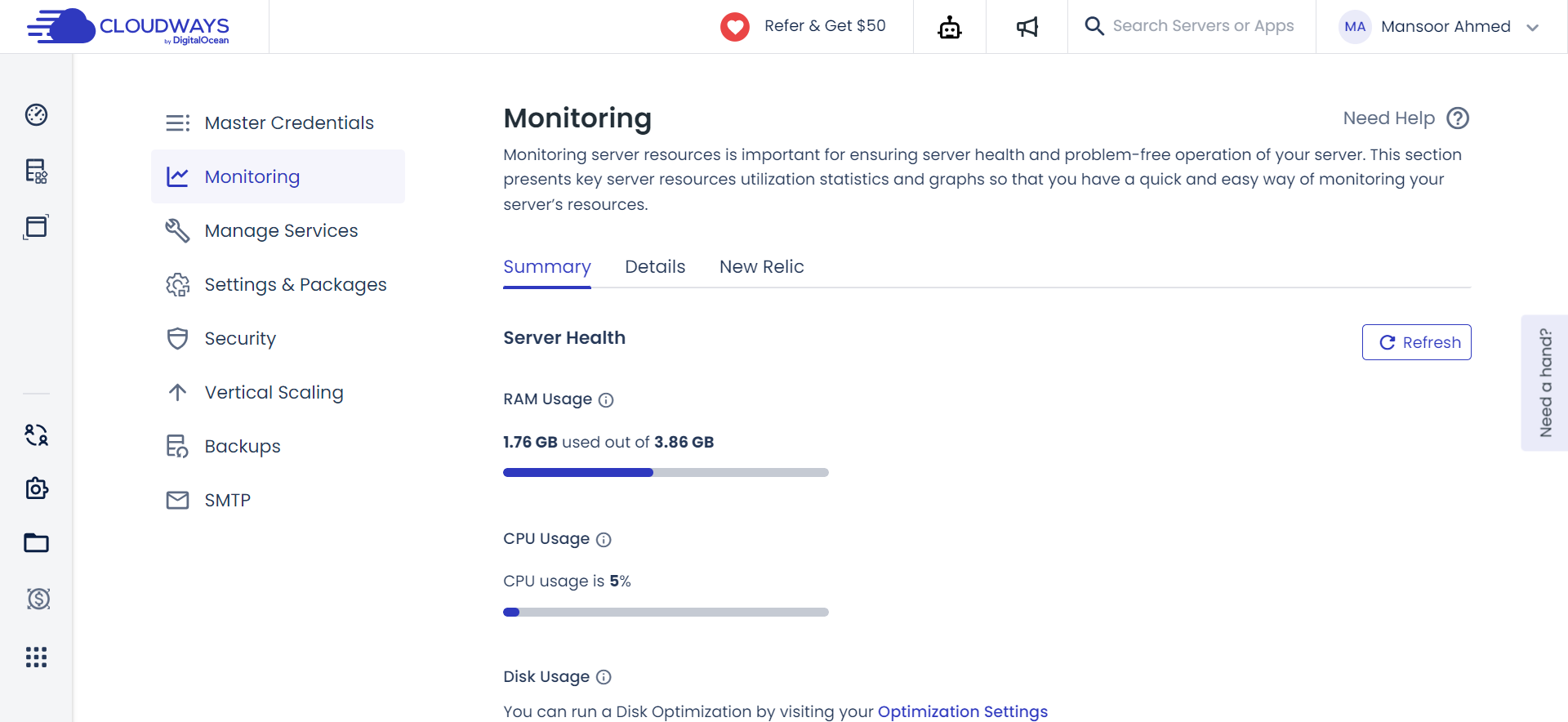
Maintaining server software up-to-date is essential for security. However, managing regular OS patches manually can be time-consuming. Cloudways alleviates this burden with regular security patches. It’s a proactive approach, ensuring your server stays secure and up-to-date. This ongoing effort minimizes vulnerabilities, contributing to a robust and well-maintained managed cloud server.
6. Automated Protection With Fail2Ban
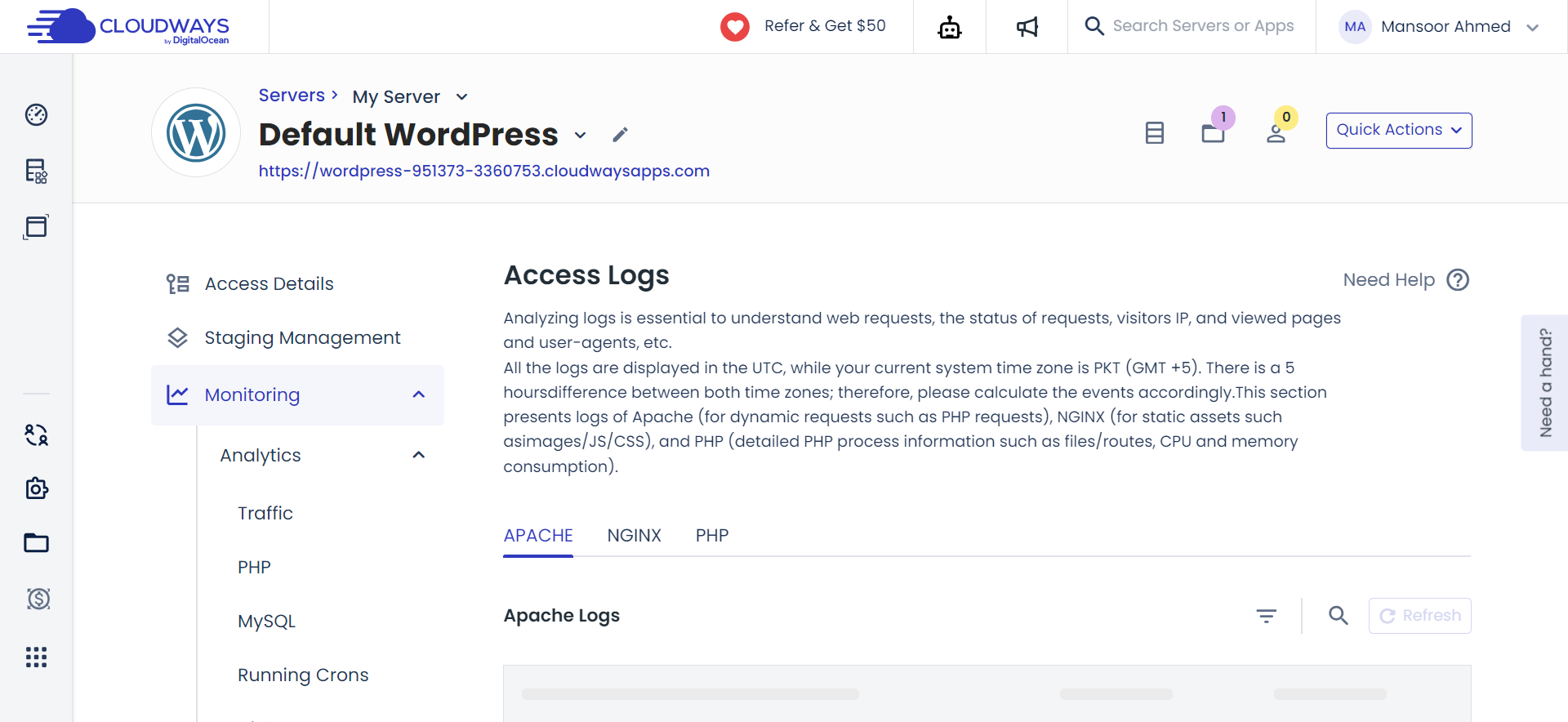
The threat of brute force attacks is ever-present, and manually monitoring logs to thwart them can be impractical. Cloudways introduces automated protection with Fail2Ban. It acts as a digital security guard, intelligently monitoring logs and blocking IPs, attempting password breaches or exploiting vulnerabilities. This automated protection ensures a safer server environment without constant manual intervention.
7. Dedicated Server-Level Firewalls
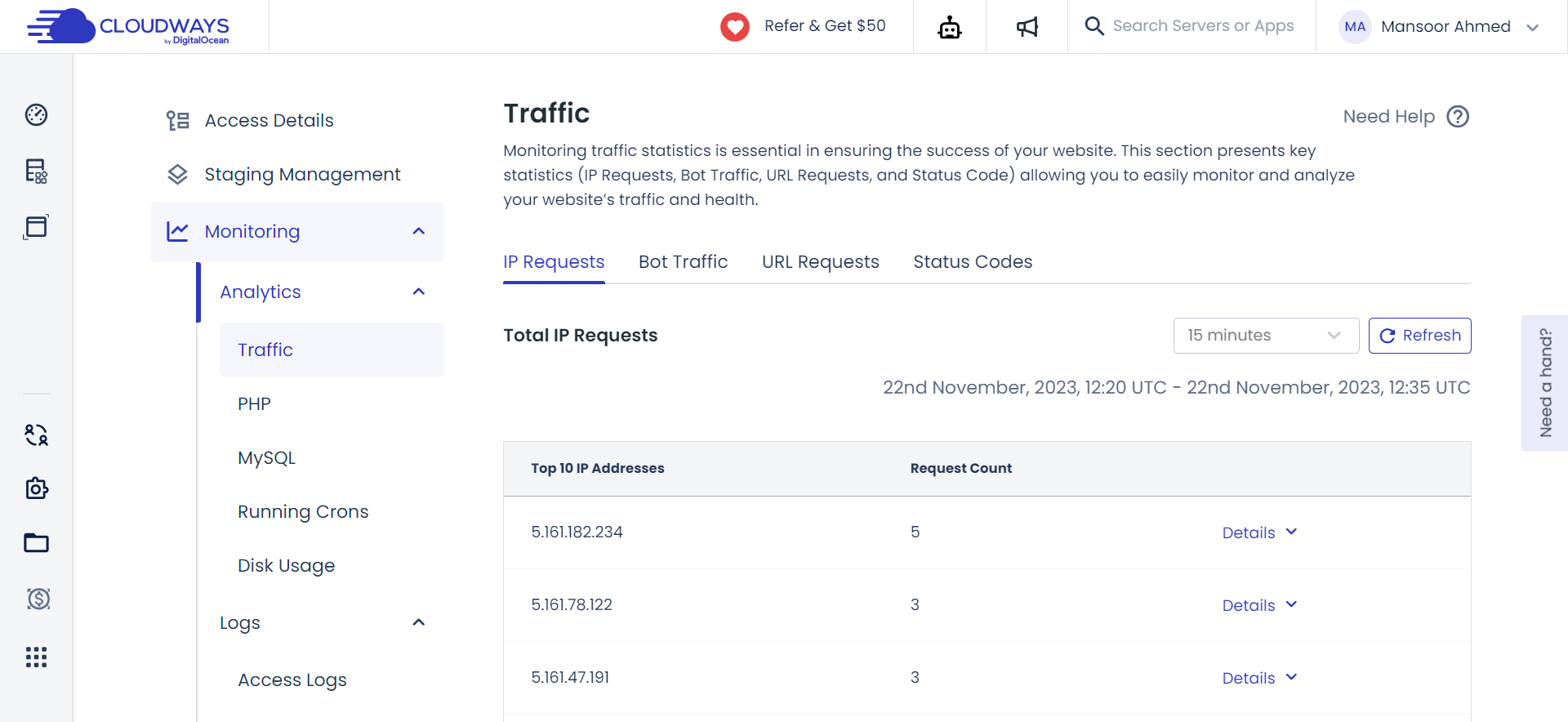
Malicious traffic poses a constant threat to server security. Cloudways implements dedicated server-level firewalls powered by Shorewall. These serve as vigilant guards, filtering malicious traffic and establishing a reliable barrier against potential intruders. It’s a security measure akin to having a trusted gatekeeper for your server.
8. Bot Protection
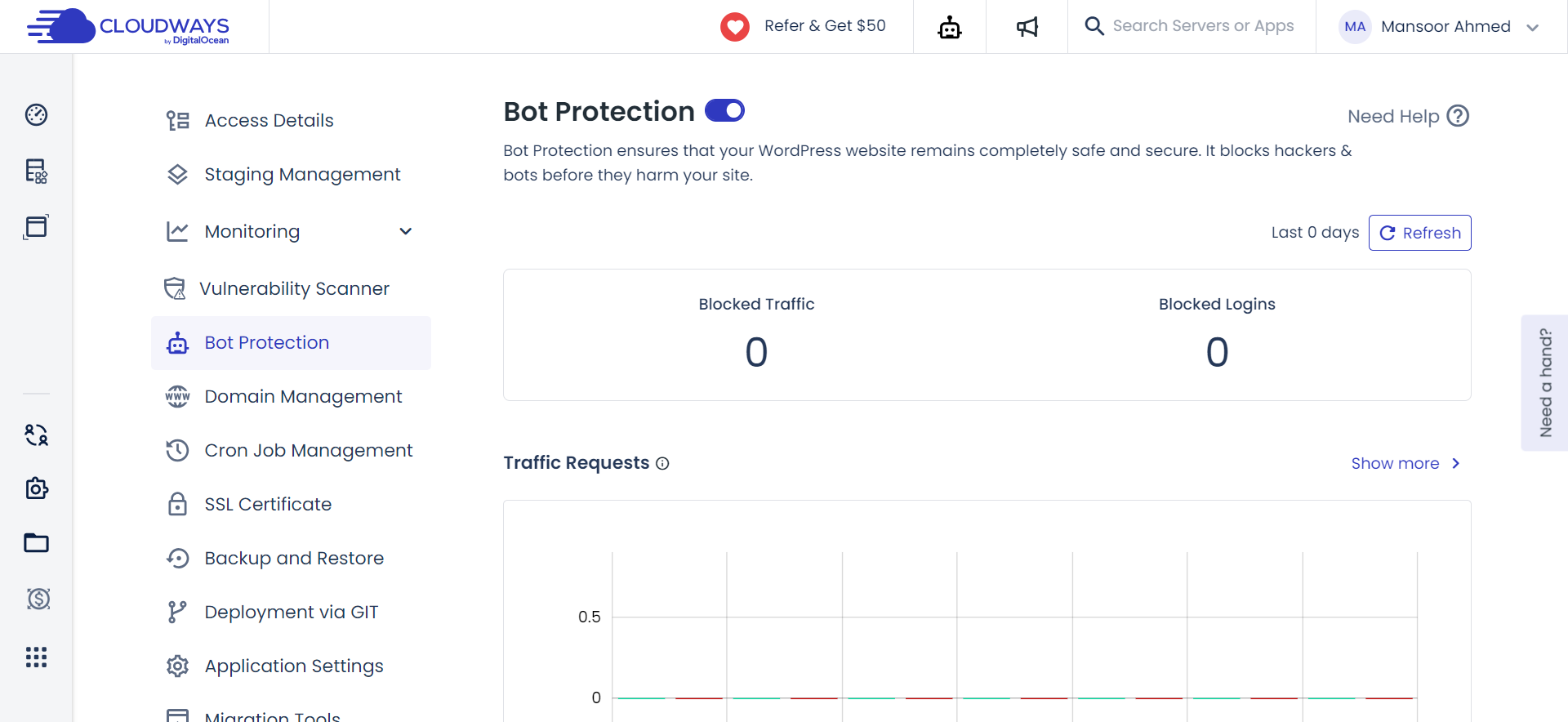
Defending against bots, login attacks, and DDoS threats is a collective effort at Cloudways, thanks to their partnership with MalCare. This collaboration ensures uninterrupted services, protecting servers from disruptive digital forces. It’s a strategic alliance, ensuring the continuous availability of your services. You can learn more about the Cloudways Bot Protection feature in detail.
9. SafeUpdates
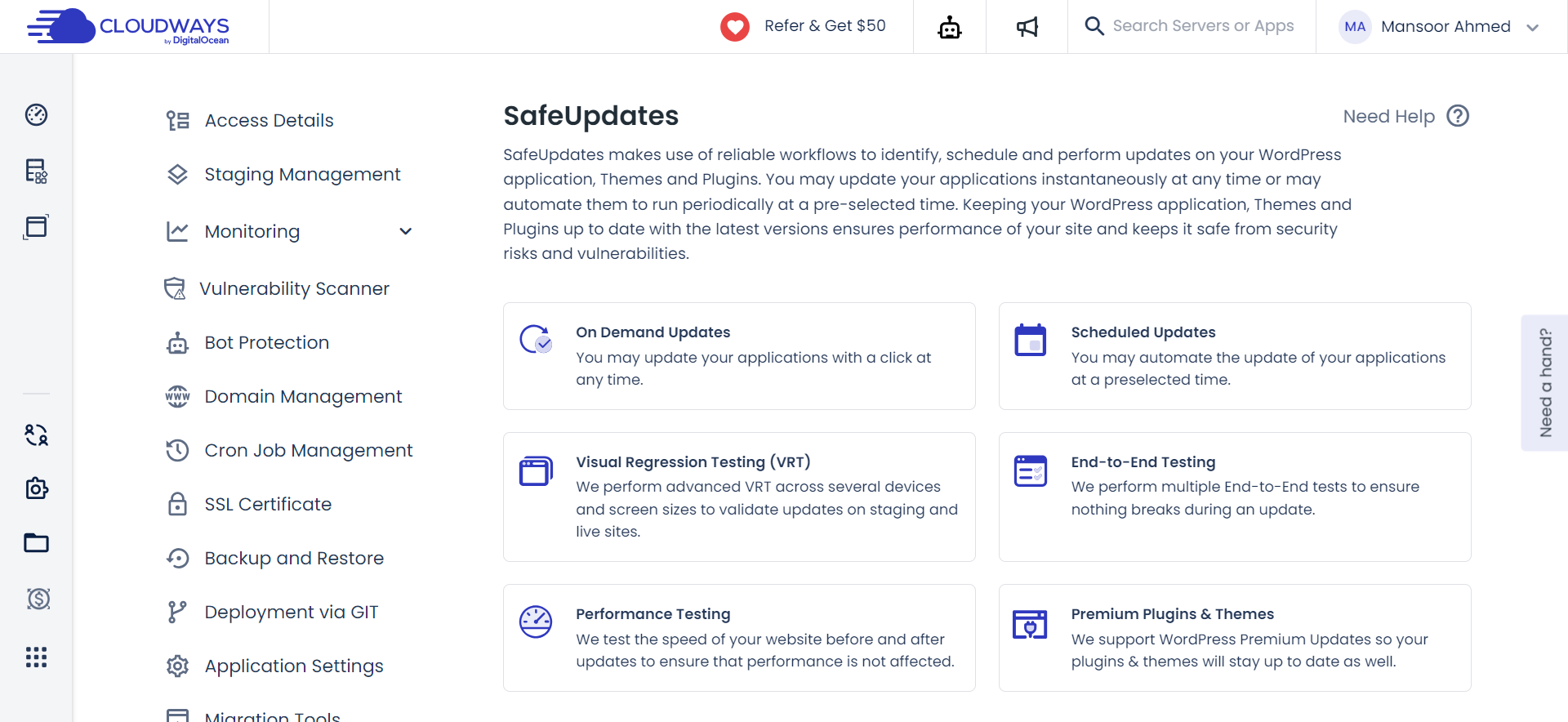
Managing WordPress updates, though crucial, can be cumbersome. Recognizing this, Cloudways introduces SafeUpdates. Realistically, SafeUpdates is an automated assistant that streamlines the process, handling the detection, staging testing, and deployment of WordPress core, theme, and plugin updates. It’s a time-saving solution, allowing users to focus on business growth without worrying about potential hiccups in the update process. All these features position Cloudways as the top choice for individuals seeking a web hosting provider with robust server security features, making it the ideal platform for hosting mission-critical sites.
The Topmost Recommended Secure Server Hosting Security Checklist
First, the Cloudways secure server hosting package plans come pre-installed with Varnish Cache, which, combined with Breeze cache, can increase your page-loading speed. Breeze away those complex cache plugins with a Hassle-Free WordPress Cache Plugin at zero expense from Cloudways. Secondly, it offers powerful features to simplify the complexities of WordPress cache plugins.
Usually, zero coding and maximum optimization with a simple user interface are the order of the day. It simplifies and takes away the hassles of WordPress caching. It’s engineered to perform at the ease of a few clicks. Plus, there are professional experts and a caring support team to assist you at any hour of the day.
When selecting a web hosting provider for your critical websites, assessing the server’s security features is essential. Here’s a checklist of server security features, along with explanations, allowing you to compare Cloudways with other providers and make an informed decision:
1. DDoS Protection
Ensure your hosting provider offers protection against Distributed Denial of Service (DDoS) attacks. This safeguard prevents overwhelming your server with traffic and maintains accessibility during cyber threats.
2. Regular Security Audits
Look for hosting providers that conduct regular security audits. This practice involves reviewing and assessing server configurations and logs to identify and address potential vulnerabilities.
3. SSL Certificate Support
Check for SSL Certificate Support, a fundamental security measure for encrypting data in transit. Hosting providers should offer options for easy implementation, such as Let’s Encrypt SSL.
4. IP Whitelisting and Access Control
Verify if the hosting service allows you to whitelist specific IPs, providing controlled access to your server. This feature enhances security by limiting access to authorized networks or regions.
5. Operating System (OS) Updates
Ensure the hosting provider regularly updates the server’s operating system. Prompt OS updates are vital for patching vulnerabilities and maintaining a secure server environment.
6. Brute Force Protection
Look for mechanisms like Fail2Ban or similar solutions that protect against brute force attacks. These tools monitor logs and automatically block IP addresses attempting unauthorized access.
7. Firewall Protection
Check if the hosting provider employs server-level firewalls to filter malicious traffic. Firewalls act as barriers, preventing unauthorized access and enhancing overall server security.
8. Bot and Malware Protection
Assess whether the hosting service includes features to defend against bots and malware inside the systems. Collaborations with external services, like Malcare, can add an extra layer of protection against disruptive digital threats.
9. Automated Update Processes
Evaluate if the hosting provider offers automated update processes for server components, including the operating system, web server software, and other critical applications. Regular updates are crucial for patching security vulnerabilities.
10. Content Delivery Network
Of course, a Content Delivery Network (CDN), like Cloudflare, can significantly improve the speed performance of content and image-heavy websites.
Summary Notes:
In the dynamic realm of online security, choosing a web hosting provider that prioritizes robust server security is essential. Cloudways, for instance, is committed to implementing and maintaining strong and Secure Server Hosting measures. Tailored for users without advanced technical skills, Cloudways ensures a secure hosting environment, defending against potential cyber threats.
Selecting such a provider is a proactive step towards safeguarding your online presence in a world where cybersecurity challenges persist.





